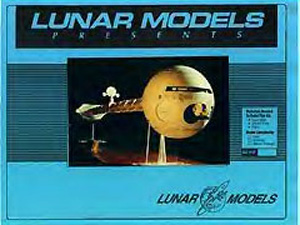Discovery from from "2001: A Space Odyssey" (1968)
About the Design
The "Discovery" interplanetary spacecraft is the setting for half of the "action" of Stanley Kubrick's 1968 sci-fi masterpiece "2001: A Space Odyssey." The ship carried a crew of six: Two primary astronauts, three mission specialists (who spent the 18 month-long trip to Jupiter in cryogenic hibernation), and one sentient HAL 9000 computer.
The craft was composed of three basic sections: The spherical command module that contained a revolving centrifuge to provide the astronauts with artificial gravity, the flight deck, and the Space Pod hangar bay; the boom-like service module that held life-support supplies and the communications array; and the engine, the big block-like section at the spacecraft's stern that housed a nuclear reactor and three nuclear engines. The need to protect the astronauts from possible nuclear contamination was the reason the ship was as elongated as it was; like many nuclear-powered spacecraft envisioned in the 1950s and 1960s, the "Discovery" was laid out so as to put as much distance between the engine and the human crew as possible. As many moviegoers and critics pointed out, the result was a spacecraft that -- intentionally or otherwise -- resembled a giant flying sperm. |
About the Kit
Although Aurora models reportedly considered creating a "Discovery" kit in injection-molded plastic (That would have been amazing!), it was left to the "garage kit" companies of the 1980s and 1990s to fill this much-needed demand from "2001" fans. The first -- and largest -- model to be produced was this three-foot-long resin kit from Lunar Models.
The kit was highly uneven in its presentation. The command and engine sections were expertly patterned and molded, requiring little finishing work. The central service section, however, was poorly designed and molded, the plethora of tiny pieces containing numerous pits and air bubbles that tended to seriously mar the appearance and integrity of the finished product. The ship's "spine" was a metal rod the modeler had to provide for him/herself. A tiny One Man Space Pod was also provided. This model is from the kit's early run. |


